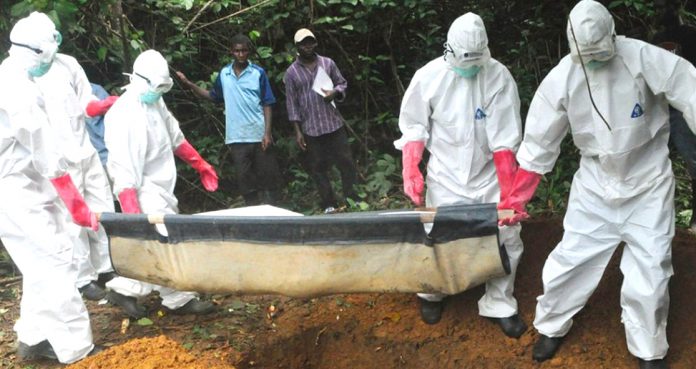According to the Democratic Republic of Congo’s health ministry, the ongoing Ebola outbreak has claimed 1,000th death with deep community distrust and frequent attack on medical center complicating the efforts to combat the current epidemic.
Public health officials have said that new 14 deaths from Ebola virus have been reported in its latest update on Friday, which is taking the toll to 1,008 deaths.
The DRC’s ministry update came after the World Health Organization (WHO) warned earlier on Friday that, “Health officials were anticipating a scenario of continued intense transmission after 126 confirmed cases were reported over a seven-day stretch ending on Sunday, a record for the current outbreak.”
Jessica Ilunga, a spokeswoman of the health ministry, explained that the increase in cases was due to frequent attack on health workers and medical centers, which has been disrupting “responsive activities.”
She said, “Security has been a big issue, and every time we have an incident, essential response activities such as contact tracing, vaccination and safe burials are suspended for an indefinite period of time, giving time and space for the virus to spread.”
In an effort to combat the outbreak, medical professionals have vaccinated over 100,000 people as part of a vaccination program backed by the government. Although the vaccine is experimental, it is estimated to be 97.5% effective.
Efforts to combat the nine-month-old epidemic have been hindered by widespread distrust among communities and repeated attacks on medical centers and health workers.
On Friday, Dr. Michael Ryan, the chief of WHO’s emergencies, said at a press conference in the Swiss city of Geneva, “Insecurity had become a major impediment to ensuring that we can access, engage with and serve the communities we wish to serve in Ebola control.”
A recent study by the Lancet Infectious Diseases journal has found that around 32% of respondents in Ebola-outbreak regions of the eastern DRC did not believe the virus actually existed, while over 36% believed that the epidemic was fabricated to destabilize the area. The study also found that less than two-thirds of roughly 1,000 respondent said they would like to get vaccinated against Ebola.
Ilunga said, “The majority of violence against the medical response is community violence, for instance when Ebola responders go to family homes because they have been alerted someone has died, but when responders arrive some people chase them away.”
She added, “But the attacks on the Ebola treatment centers are more coordinated, by some kind of organized armed groups. It is worrying, especially because the future of the outbreak depends on factors outside of our, the Ministry of Health’s control.” Repeated failures to combat the outbreak have made it the second-deadliest outbreak in history, trailing an epidemic between 2013 and 2016, which killed nearly 11,300 people in West Africa as the number of cases surged through Sierra Leone, Guinea, and Liberia.






















